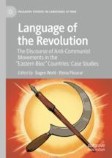Search
Search Results
-
Probabilistic semantics for epistemic modals: Normality assumptions, conditional epistemic spaces and the strength of must and might
The epistemic modal auxiliaries must and might are vehicles for expressing the force with which a proposition follows from some body of evidence or...

-
“The Sound Must Seem an Echo to the Sense”: Experiencing Oral and Silent Reading of Poetry
Poetry originates in social orality: music and voice are fundamental for the way it functions. Important are both the emotional ingredients in poetry...
-
“Xylella is the Enemy that Must be Fought”: Representations of the X. Fastidiosa Bacterium in the Media Discourse
The paper explores media representations of Xylella fastidiosa , the bacterium that causes severe plant diseases, using data from online sources in...
-
“Words That Must Not Be Named”: Narratives of Language, Power, and Identity in Communist Romania
This longitudinal study examines the multilayered connection between language, power, and identity through the emic perspectives of four ethnic...
-
Must All Theses Be Written in English? Implications of Language Requirements in UK Universities
British universities have benefited considerably from the internationalisation agenda and the contribution of international students to academic...
-
What ‘must’ adds
There is a difference between the conditions in which one can felicitously use a ‘must’-claim like (1-a) and those in which one can use the...
-
A Challenge, a Must, an Adventure: English as a Foreign Language for Deaf and Hard of Hearing Students
This chapter describes principles, strategies and communication techniques which have been and might be effective in English classes for deaf and...
-
The Language of Corporate Communication Functional, Pragmatic and Cultural Dimensions
This book explores diverse cultural and linguistic landscapes, unraveling the fusion of language, culture, and corporatism. It breaks new ground by...

-
Must vs Have To
I must change train in Rome - there is no train that goes direct.
-
The prosody of Spanish acronyms
This paper presents a first attempt to formally characterize the prosodic properties of Spanish acronyms. Based on the examination of a dataset and...

-
Tracking Interaction in Chinese Scholars’ Academic Writing Through the Lens of Metadiscourse
This book tracks changes in the use of metadiscourse in Chinese scholars’ English and Chinese research articles, discusses how these changes reflect...

-
The Heremod Digressions in Beowulf: A Reassessment
The present article reassesses the legend of Heremod and its relevance to Beowulf . It argues on the basis of analogues preserved in Saxo...
-
Argument ellipsis as external merge after transfer
Argument Ellipsis (AE) is a productive process in Hebrew, but some arguments resist ellipsis—precisely those that do not denote individuals. This...

-
Language Education During the Pandemic Rushing Online, Assessment and Community
This edited book explores and illustrates successful practices for online assessment and community-building, based on the authors' own classroom...
-
The orthographic representation of a word’s morphological structure: beneficial and detrimental effect for spellers
In this paper we present a review of the literature on the role of a word’s morphological structure in written language processing, with an emphasis...
-
Allomorphy in Semitic discontinuous agreement: Evidence for a modular approach to postsyntax
Discontinuous agreement in Semitic verbal paradigms—that is, the exponence of agreement with a single argument distributed over more than one...

-
(Dys)functional Spaces: Navigating Orphanhood in Lemony Snicket’s A Series of Unfortunate Events
The passage from one space to another in children’s literature can be seen as a metaphor for the threshold between childhood and (young) adulthood,...
-
Still going strong
In “ Must ...stay ...strong!” (von Fintel and Gillies in Nat Lang Semant 18:351–383, 2010. https://doi.org/10.1007/s11050-010-9058-2 ), we set out to...

-
Epistemic modality in upper elementary students’ argument writing: a feature of argumentation
Language is essential for making meaning in written communication, and argument writing is a key genre of schooling to which language contributes...
-
The indexical character of epistemic modality
We assume a central thesis about modal auxiliaries due to Angelika Kratzer, the modal base presupposition: natural language expressions that contain...

